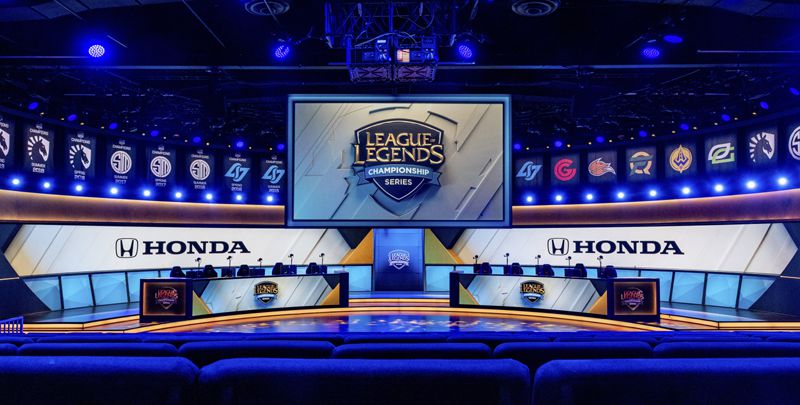Mentioned in this article
- Honda has partnered with Riot Games to become the exclusive automotive partner for the League of Legends Championship Series (LCS), including LCS Scouting Grounds.
- Team Liquid partnered with the brand earlier this year, making Honda the first automaker in North America to sponsor both an esports team and league.
- Riot likens the duel partnership to those in traditional sports and is committed to creating “fair and equitable” content with Honda without giving Team Liquid preferential treatment.
Less than a year after partnering with Team Liquid, Honda has expanded its esports strategy to include the entire League of Legends Championship Series (LCS). Honda says that it will use both partnerships to engage with millennial and Gen Z fans of League of Legends as well as other games fielded by Team Liquid. Financial terms of the agreement were not disclosed.
Honda will be the exclusive automotive partner of LCS beginning with the Summer Split Playoffs in Los Angeles August 10 and continuing with the Finals in Detroit on August 24-25. In addition, the company will sponsor the League MVP and the LCS Scouting Grounds, which helps up-and-coming players gain visibility to LCS teams.
This commitment to the entire esports ecosystem was one of the qualities that attracted Riot to Honda, Matthew Archambault, head of esports partnerships and business development for North America at Riot Games, told The Esports Observer.
“Honda [has] a true cause toward driving the amateur system,” said Archambault. “They’ve been doing it since some of their music activations with Honda Stage. They are fully committing not only just at a professional level but at that path-to-pro ecosystem, too.”
Team Liquid announced a partnership with Honda in January, which includes that automotive brand’s logo on team jerseys, merchandise, and a fleet of branded Honda Civics. The team arrives at events in a Team Liquid emblazoned Honda Odyssey minivan.
“They are fully committing not only just at a professional level but at that path-to-pro ecosystem, too.”
The LCS deal makes Honda the first automotive brand in North America to sponsor both an esports league and one of its teams.
“We were working on expanding our overall gaming strategy for the beginning of this year and that’s about when the TL deal came together,” Manager of Media Strategy at American Honda Phil Hruska told The Esports Observer. “At the same time, we were taking this crawl-walk-run approach so we were looking for other opportunities concurrently. The Riot deal took longer to put together but it was a natural evolution of what we had built with TL.”
Hruska described the public’s response to its Team Liquid partnership as “overwhelmingly positive, particularly on social media.”
“One of the main business points of this [partnership] is trying to use social media and esports as a new medium so that as people watch less traditional media, we evolve our media mix to follow where the eyeballs are going,” added Hruska.
(A video created by Honda and Team Liquid, released in January.)
To bridge the gap between Honda’s two sponsorships, the company has produced two 15-second videos, each showcasing a member of Team Liquid as they “find their drive” to success. The spots will run on Twitch, YouTube, Reddit, Twitter, Facebook, and Instagram, as well as during Honda’s LCS sponsorship. Honda will then collaborate with Riot to create similar content featuring other LCS talent.
Archambault explained that, aside from these commercials, none of the teams will be positioned above any other when it comes to LCS marketing activations.
Riot’s studio and content teams are driving the content to be “fair and equitable across the entire league based on the storyline,” Archambault said. “Obviously, as a league operator, I love all of my teams equally.”
Honda has been an active non-endemic partner in the videogame industry since 2014, sponsoring EA’s first NHL World Championship and integrating vehicles into the Forza racing game franchise, among other activations. From the beginning, the automaker’s focus has been reaching young consumers.
“In terms of LCS, we’ve been very methodical in our approach in looking to define our work with partners.”
When it came to aligning its target demographic for the Honda Civic—younger millennials and Gen Z—League of Legends were a “match made in Heaven,” said Hruska, adding that the Civic and Accord are the top two vehicles sold to first-time buyers across the industry and Civic has been the top-selling vehicle to millennials since 2011.
Franchising LCS has been a “big win” for Riot in terms of partnerships and other areas, Archambault said, which drives “League health.” Among other advantages, franchising allows Riot to leverage the stability of which teams are participating each year, enabling them to plan content and tap into existing rivalries.
“In terms of LCS, we’ve been very methodical in our approach in looking to define our work with partners,” said Archambault. “We don’t want to work with the partner that’s just going to come in and check a box on the esports audience and then present that to the board or look to our audience and our demographic as purely a monetization standpoint. We want to find partners that are actually looking to invest in the space.
“A lot of what Honda has been trying to do is capture the eyes and the vision of those younger individuals as they continue to drive forward and this is a perfect situation to do that. I think it’s a great ‘level up’ from the relationships that we announced earlier this year with FACEIT.”
This interview was conducted by Trent Murray.

